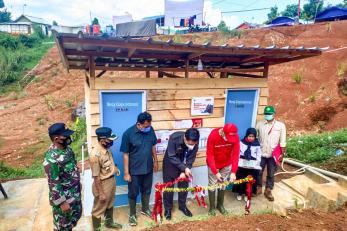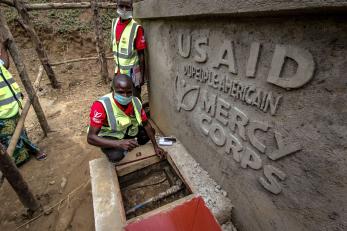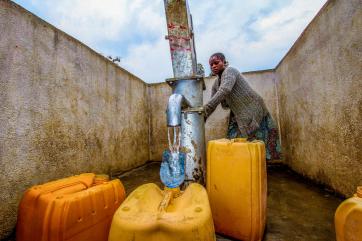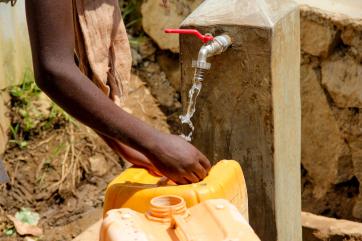What’s your WASH IQ?
Test your knowledge of all things water, sanitation, and hygiene. Once you’ve made your guess for all five questions, scroll to the bottom of the page to see the correct answers.
1. True or False: Globally, more people have a mobile phone than a toilet.

2. Mercy Corps' sanitation solutions go beyond immediate needs to help...:
A. Create job opportunities
B. Spark positive behavior change
C. Improve resilience against future challenges
D. All of the above

3. Mercy Corps has implemented more than 500 water, sanitation, and hygiene (WASH) programs over the past 15 years. How many people did these efforts reach in the last year?
A. 1 million
B. 5 million
C. 9 million
D. 13 million
4. Which of the following is a feature of the new latrines recently constructed by Mercy Corps in Syria?
A. Solar-powered interior lighting
B. Power adjustable heated seats
C. Built-in smartphone holder
D. Automatic air freshener spray


5. In the Democratic Republic of Congo, which local stakeholders did Mercy Corps WASH teams consult with to ensure sanitation and water access solutions are safe for women and girls?
A. Community elders
B. Women and girls living in the region
C. Local governments and organizations
D. All of the above
Keep scrolling to see how you did on our quiz.
Answers
1. The answer is True — More people have a mobile phone than a toilet.
WASH is key to improving public health, wellbeing, and community resilience. Yet, globally, two billion people around the world lack access to toilets or latrines, one in three people do not have access to safe drinking water, and two in five people do not have access to basic hand-washing facilities with soap and water.
Mercy Corps is committed to changing that. Our WASH teams help ensure more people have access to clean, safe hygiene facilities.
2. The answer is D — All of the above
Mercy Corps works with communities to implement comprehensive, long-term solutions to promote public health and development.
Our integrated WASH approach supports locally appropriate solutions for emergency, recovery, and long-term development scenarios. We work with government and community stakeholders on everything from water trucking and water network repairs to hygiene promotion and cash vouchers for WASH items.
3. The answer is D — 13 million people
This year, our WASH initiatives have reached nearly 13 million people — including millions of children — in 29 countries.
Unsafe water, inadequate sanitation, and poor hygiene directly contribute to child mortality and complicate the control and prevention of infectious disease outbreaks like Ebola, cholera, and more recently COVID-19.
4. The answer is A — Solar-powered interior lighting
In order to keep WASH services sustainable, they need to be cost effective. That’s why we focus on identifying and testing smart technology solutions and evidence-based approaches. Innovations in digital technology can dramatically improve monitoring and functioning of water and sanitation systems, for cleaner, safer, and more reliable water resources.
Solar energy is an efficient and sustainable lighting solution for hygiene facilities at displacement camps in Northwest Syria.
5. The answer is D — All of the above
Ensuring the safety of women and girls is a key priority when designing WASH solutions. Water collection is typically their responsibility, so women and girls are most impacted when the water supply is far away or challenging to reach. They may have to devote much of their day to collecting water which can increase school dropout rates and the risk of sexual and gender-based violence.
At the end of the day, Mercy Corps’ goal is to build and restore equitable solutions and effective WASH systems that we’re able to hand back to communities. Because every person should have access to safe drinking water, soap and water for handwashing, and toilets or latrines.
We hope you enjoyed learning about the importance of WASH around the world. Share this quiz with a friend, and learn more about our work here >